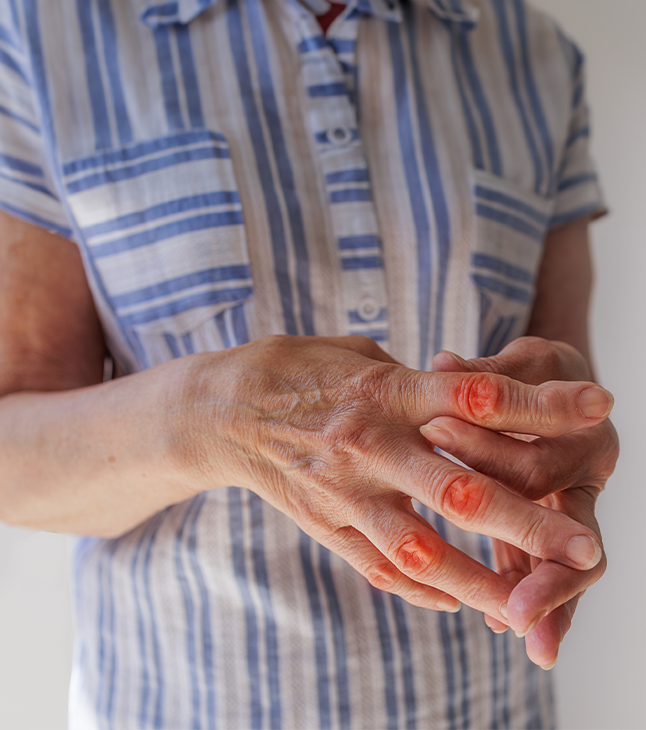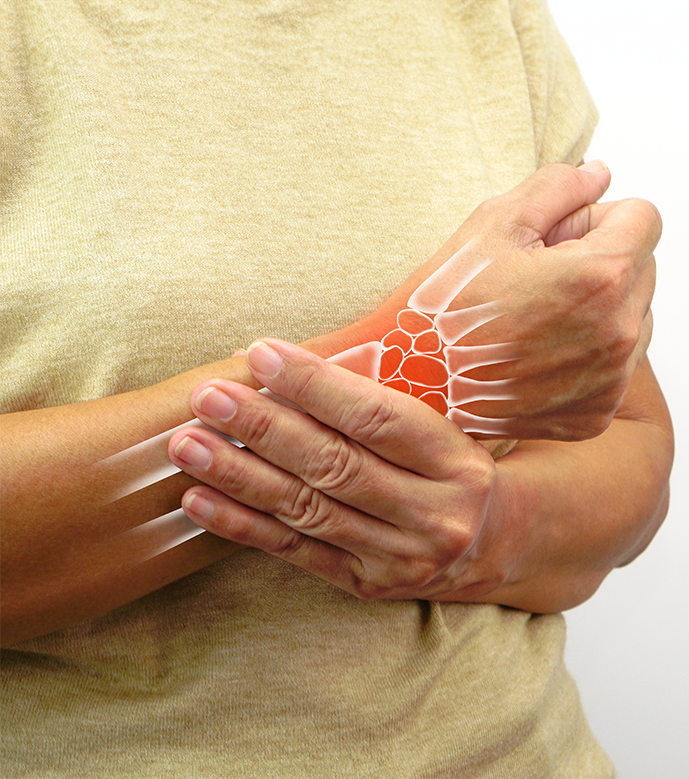Take Control
On Rheumatoid Arthritis
With Ayurveda!
Ayurved se sambhav hai !
Consult with our expert doctors today.
Enter your details to book a personalized consultation.
What is Rheumatoid Arthritis?
Rheumatoid arthritis (RA) is a chronic autoimmune disease that primarily affects the joints, leading to inflammation, pain, and stiffness. Unlike osteoarthritis, which is a wear-and-tear condition, RA occurs when the body’s immune system mistakenly attacks the synovium (lining of the joints), causing inflammation. Over time, this inflammation can lead to joint damage and deformities.
RA can affect other organs and systems in the body, and it typically involves multiple joints, with a preference for small joints, such as those in the hands, wrists, and feet. The condition can vary from mild to severe and can lead to physical disabilities if not managed properly.

What Causes Rheumatoid Arthritis?
The exact cause of RA is not known, but several factors may contribute to the development of the condition:
- Genetic Factors: People with a family history of RA or other autoimmune diseases are at a higher risk. Certain genes, such as the HLA-DR4 gene, have been linked to RA.
- Immune System Dysfunction: RA is an autoimmune disease, meaning the immune system mistakenly attacks the body’s own tissues, particularly the synovium in joints. The exact trigger for this immune response is unclear.
- Environmental Triggers: Factors such as viral or bacterial infections (e.g., Epstein-Barr virus), smoking, and exposure to environmental toxins may trigger RA in genetically predisposed individuals.
- Hormonal Factors: RA is more common in women, particularly during their childbearing years, suggesting that hormonal factors (such as estrogen) may play a role.
- Age and Gender: RA can affect anyone, but it is most common between the ages of 30 and 60, and women are three times more likely than men to develop the disease.
Symptoms Of Rheumatoid Arthritis?
RA symptoms can vary between individuals, and they may come and go. Common symptoms include:
- Joint Pain and Swelling: Typically symmetrical (affecting both sides of the body), involving small joints like those in the hands, wrists, knees, and feet.
- Stiffness: Especially in the morning, lasting for more than 30 minutes.
- Fatigue: A general sense of tiredness or lack of energy.
- Warmth and Redness: Inflammation around the affected joints can make them warm to the touch and cause redness.
- Reduced Range of Motion: Due to joint inflammation and damage.
- Joint Deformities: Over time, persistent inflammation can lead to joint deformities, such as “U” or “Z” shaped fingers.
- Systemic Symptoms: These can include low-grade fever, weight loss, and loss of appetite.

Types of Rheumatoid Arthritis

Seropositive Rheumatoid Arthritis
This is the most common form of RA, where blood tests show positive levels of rheumatoid factor (RF) and anti-citrullinated protein antibodies (ACPAs), both of which are markers of autoimmune activity.

Seronegative Rheumatoid Arthritis
In seronegative RA, the blood tests for rheumatoid factor and ACPAs come back negative, but the person still experiences the symptoms and joint inflammation typical of RA. The cause is not fully understood.

Juvenile Rheumatoid Arthritis (JRA)
This is a form of RA that affects children under the age of 16. It can cause symptoms similar to adult RA, including joint pain, swelling, and stiffness.

RA with Systemic Involvement
This type of RA is characterized by more widespread symptoms and may involve other parts of the body beyond the joints, such as the heart, lungs, skin, and eyes.
Ayurvedic Treatment for Rheumatoid Arthritis
Panchakarma Therapies
- Abhyanga (Oil Massage): Helps to reduce inflammation, improve circulation, and promote relaxation.
- Shirodhara (Oil Drip Therapy): Can help reduce stress and balance the nervous system, which is beneficial in autoimmune conditions like RA.
- Basti (Enema Therapy): Used to eliminate toxins and balance Vata dosha, which is often involved in autoimmune diseases.
- Virechana (Purgation Therapy): Helps to cleanse the body of toxins and reduce inflammation.
Ayurvedic Herbal Remedies
- Ashwagandha: Known for its anti-inflammatory and adaptogenic properties, it can help reduce stress and inflammation in RA.
- Turmeric (Curcumin): Contains the anti-inflammatory compound curcumin, which has been shown to help reduce symptoms of RA.
- Ginger: Has natural anti-inflammatory properties and can be used to reduce joint pain and stiffness.
- Guggulu: Used to treat joint diseases and inflammation, including RA.
- Triphala: A detoxifying blend of three fruits that can help with overall inflammation reduction and digestive health.

